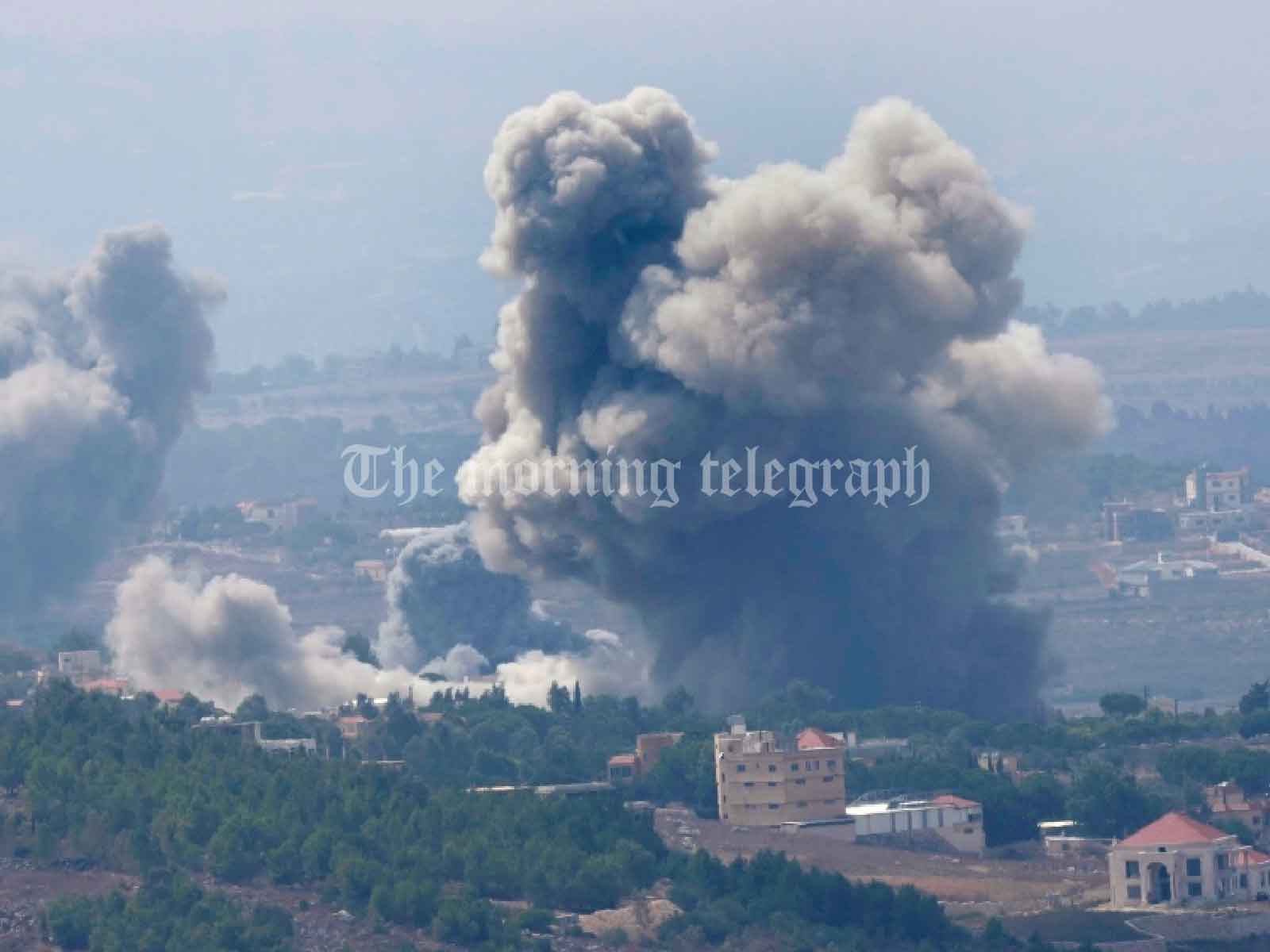
MARJAYOUN, Lebanon — Israeli airstrikes on Lebanon claimed the lives of at least 492 people on Monday, including 90 women and children, according to Lebanese authorities. The strikes, the deadliest since the 2006 Israel-Hezbollah war, intensified as Israel expanded its military campaign against Hezbollah across southern and eastern Lebanon, prompting a mass exodus of civilians.
The Lebanese Health Ministry confirmed the staggering death toll, stating that 1,645 people were wounded. Southern and eastern Lebanon bore the brunt of the airstrikes, which targeted Hezbollah military installations and infrastructure, but also resulted in widespread civilian casualties. Residential areas and medical facilities were heavily hit, with hospitals and ambulances among the targets, further straining the country’s fragile health system.
The bombardment marks a critical escalation in the conflict between Israel and Hezbollah, a Lebanese militant group backed by Iran. Israeli Prime Minister Benjamin Netanyahu issued an urgent warning to Lebanese civilians in the south and east, urging them to evacuate immediately: “Take this warning seriously. Please get out of harm’s way now. Once our operation is finished, you can come back safely to your homes.”
Netanyahu’s call for evacuation comes as the Israeli military ramps up its air campaign, targeting what it describes as Hezbollah’s extensive military infrastructure, much of which is embedded in civilian areas. Israeli military spokesperson Rear Adm. Daniel Hagari declared that the military would “do whatever is necessary” to eliminate Hezbollah’s presence along the border. He added that the airstrikes had significantly damaged Hezbollah’s arsenal, but refused to provide a timeline for the operation, leaving open the possibility of a ground invasion.
The Israeli military said Monday’s airstrikes hit 1,600 Hezbollah targets, including rocket launch sites, missile storage facilities, and command centers. Hagari revealed that Hezbollah has fired around 9,000 rockets and drones into Israel since last October, including 250 on Monday alone, intensifying fears of an all-out war in the region.
Civilians Flee, Hospitals Strain Under Attack
The attacks have prompted a massive displacement of civilians, with thousands fleeing the south. Highways leading from cities like Sidon toward Beirut were jammed with cars, as families sought refuge in the capital. Many residents of southern Lebanon received urgent text messages from the Israeli military, warning them to evacuate any buildings that might be harboring Hezbollah weapons.
Health Minister Firass Abiad condemned the strikes on medical centers and hospitals, urging hospitals across southern Lebanon and the Bekaa Valley to prioritize treating the injured from the airstrikes and postpone non-urgent surgeries. He warned that the Lebanese healthcare system, already battered by years of economic collapse and the aftermath of the 2020 Beirut port explosion, was nearing its breaking point.
Lebanese authorities have scrambled to provide emergency shelters for the displaced, and schools and universities have been ordered closed across most of the country.
Hezbollah Strikes Back, Raising Fears of Wider Conflict
Hezbollah retaliated with a series of rocket attacks on Israeli military bases and facilities, including the headquarters of the Rafael defense firm in Haifa. Hezbollah fighters, emboldened by their support for Hamas in Gaza, vowed to continue their attacks until a ceasefire is reached in Gaza.
Monday’s strikes are part of a growing pattern of violence between Israel and Hezbollah, which has steadily escalated over the past year. Hezbollah began firing into northern Israel shortly after Hamas’ surprise attack on October 7, which killed 1,200 Israelis and triggered a broader Israeli offensive in Gaza. Since then, Hezbollah has launched thousands of rockets and missiles into Israel, pinning down Israeli forces in the north and further complicating Israel’s military operations in Gaza.
Israeli officials have warned that Hezbollah’s rocket stockpile, estimated at around 150,000, includes long-range missiles capable of striking deep into Israel. The threat posed by Hezbollah’s arsenal has led Israeli military planners to prepare for the possibility of a ground invasion of Lebanon, a move that could trigger a broader regional war.
International Calls for Diplomacy Amid Rising Tensions
The growing conflict between Israel and Hezbollah has raised alarms among international leaders, many of whom are urging restraint to prevent further escalation. U.S. President Joe Biden’s administration expressed concern over the violence, with White House Press Secretary Karine Jean-Pierre emphasizing the need for a diplomatic resolution. “It’s in everyone’s interest to resolve this quickly and diplomatically,” she said.
The U.S. State Department is reportedly preparing “concrete ideas” to de-escalate the conflict, which it will present to allies at the United Nations General Assembly this week. A State Department official, speaking anonymously, said the goal is to offer an “off-ramp” for both Israel and Hezbollah to step back from the brink of war.
U.N. Secretary-General António Guterres has expressed alarm over the violence, particularly the heavy civilian toll in Lebanon. U.N. peacekeeping forces in southern Lebanon, stationed near the Israeli border, have ceased patrols and are staying within their bases due to the intensity of the exchange of fire. The U.N. has also condemned the growing civilian casualties in Lebanon, calling for both sides to exercise restraint.
Historical Parallels and Humanitarian Concerns
Monday’s death toll surpasses the casualties of the 2020 Beirut port explosion, one of the most devastating events in Lebanon’s recent history. The port explosion, caused by the detonation of improperly stored ammonium nitrate, killed at least 218 people and left over 6,000 wounded. The current airstrikes are already being compared to the devastation of the 2006 war, which left more than 1,200 Lebanese dead, mostly civilians, and displaced hundreds of thousands.
Lebanon is still reeling from a years-long economic crisis that has left much of its population impoverished and without access to basic services. The new wave of violence has further strained Lebanon’s infrastructure and humanitarian capabilities, with the United Nations and international NGOs warning of a looming disaster as displaced civilians overwhelm the country’s ability to respond.
As both sides prepare for further confrontation, the possibility of a full-scale war looms large. While diplomatic efforts continue, the growing death toll and the displacement of thousands of civilians suggest that the conflict may yet escalate into a broader regional crisis with devastating consequences for Lebanon, Israel, and the wider Middle East.




